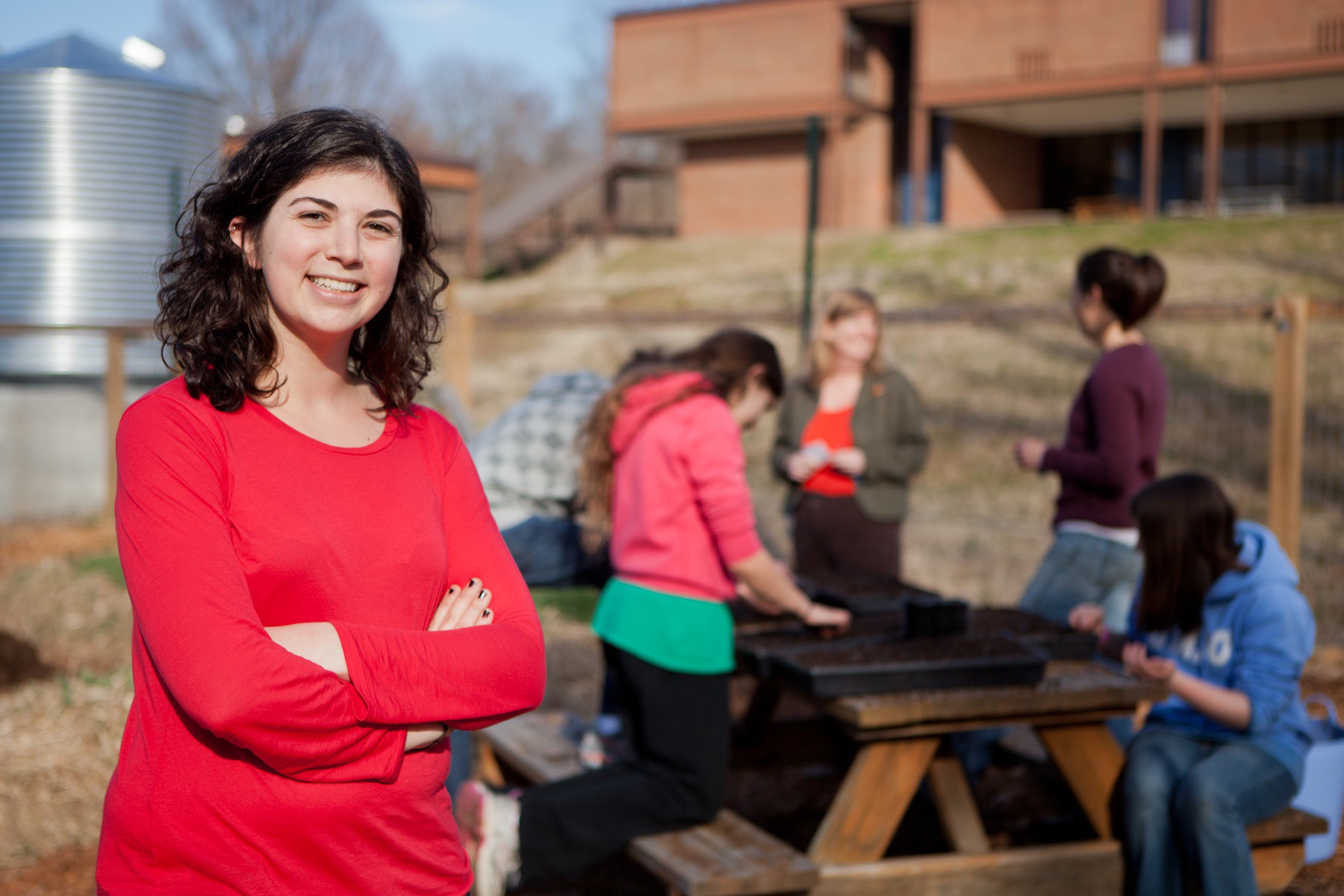February 29, 2012 — University of Virginia fourth-year student Erin Block is fired up about gardening, and her enthusiasm has branched into several efforts to benefit gardens at local schools that she hopes will bear fruit long after she graduates.
With the help of undergraduate research funding and faculty experts across Grounds, she's helping lay the foundation for a multiyear research undertaking to assess the educational benefits of the City Schoolyard Garden at Buford Middle School.
Block traces her enthusiasm for local food and organic gardening to spring 2010, when she worked for three weeks as a volunteer farmhand on the organic Brightwood Vineyard and Farm in Madison County, about a 45-minute drive from Grounds. There she experienced the wonder that comes with growing food.
Soon afterward, she started volunteering at the Buford garden. Created in 2010, it serves as a test bed and template for the creation of gardens at other city schools.
Realizing that the creation and maintenance of school gardens is a community effort, supported by dozens of people – including community members and fellow students – Block began contemplating how she and other undergraduates can best contribute to the larger effort, ideally with an impact that continues after she and her peers have graduated and left Charlottesville.
In the fall, Block got some inspiration from two of her courses.
After winning a $900 Community-Based Undergraduate Research Grant in spring 2011 to evaluate the effectiveness of the Buford garden as an experiential learning environment, Block learned, she said, how to best go about that assessment in a fall class on "Wise Interventions: Social Psychology for Public Policy," taught by Sophie Trawalter, an assistant professor of public policy and psychology in the Frank Batten School of Leadership and Public Policy.
Garden supporters have been eager back up anecdotal reports of the garden's learning effectiveness with some data, said Linda Winecoff, program director for the City Schoolyard Garden.
Buford's two seventh-grade life science teachers, Betsy Donahue and Brenda Kovarik, suggest that their seven-week garden curriculum (this spring will be its fourth iteration), is providing a number of educational benefits.
"It may sound simple, but getting the kids to really understand how to follow the scientific method on their own always seems to be a challenge," Donahue said. The garden curriculum "really seems to help them understand this."
Block's understanding of research design was honed in Trawalter's class, but as a psychology major in the College of Arts & Sciences, Block had no training specifically in assessing educational outcomes, so she sought advice from Curry School of Education professor Eleanor Wilson and Jess Kalagher, the science curriculum coordinator for the city schools.
Kalagher found a test used in Missouri that was easily adapted to Buford's needs. In early February, the test was administered for the first time, creating baseline data. This semester's cohort of Buford life science students will take the test again after they go through the seven-week garden curriculum.
The first results are expected in May, but more comprehensive analysis will require several years of data, said Block's adviser, politics professor Paul Freedman.
"Doing important research is hard and takes money, and more time than a semester," he said. "But those challenges make what she's doing more important, not less important. The most important thing Erin is doing is building a template for future research."
Block is pursuing another garden-related project as a yearlong independent study course with two other students, fourth-year Judith Yang and second-year Libby Lyon, both urban planning majors in the School of Architecture. Their adviser is Tim Beatley, Teresa Heinz Professor of Sustainable Communities.
Last semester, the trio created an initiative, dubbed "Inch-by-Inch" (a hat-tip to a verse in the 1970s-era "Garden Song"), to help create gardens in more Charlottesville schools.
The trio has already researched school garden benefits and successful programs in other cities, and helped schools apply for grants that could help pay for new gardens. They also plan to create a pipeline of U.Va. student volunteers, Block said.
With help from a Jefferson Public Citizens grant, Block, Yang and Lyon visited one of the nation's flagship schoolyard gardens, at P.S. 216 in Brooklyn, the first New York affiliate of the pioneering Edible Schoolyard program, developed by restaurateur and former Montessori teacher Alice Waters' Chez Panisse Foundation.
The day they visited was a school holiday. In addition to the school's four garden educators, an elderly gentleman, at least 80 years old, was tending the tomatoes. "He called them 'his tomatoes,'" Block said. He had attended that very same school many decades earlier.
The P.S. 216 garden is an example of how a garden can be a focal point for the local community, bringing people together across generations, Block said. "I'd love to see a garden, staffed with a paid garden educator, at every single school in Charlottesville."
– by Brevy Cannon
Media Contact
Article Information
February 29, 2012
/content/one-student-love-gardens-sprouts-several-projects

